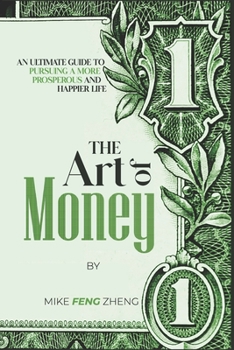The Art of Money: An Ultimate Guide To Pursuing A More Prosperous And Happier Life
It is not always about what you know when it comes to money. It is about how you act and choose to live your life. Moreover, the proper way of life is challenging to adopt, even for the most intelligent people.
Money-investing, personal finance, and lifestyle choices-is typically taught as math-based knowledge, with data and formulas guiding us. People do not make financial decisions on spreadsheets in the real world. They make them on the spur of the moment or in Starbucks, where personal beliefs, your unique worldview, ego, vanity, personality, and motivations are all scrambled together.
Author Mike Feng Zheng shares numerous stories, examples, and illustrations in The Art of Money that explore lifestyles influencing people's money management decisions. Mike also explains how everyone can be their financial advisor and fund manager and why we should all take complete control of our investments rather than relying on others. Please visit www.mikefengzheng.net to read more of Mike's blogs and free articles. Also, please click on Mike Feng Zheng's name above to go to his Amazon author page and look at his other book, 12 Principles for Life, to learn more about how to deal with and manage problems in various aspects of life.
In the first chapter, we discuss the factors contributing to our unhappiness. We examine them through the lens of our society's generally accepted norms of value and culture. In Chapter 2, we discuss how we compare traditional slavery to modern forms of corporate slavery. In Chapter 3, we discuss the idea that the notion that the United States of America is a free country is merely an illusion. What exactly should the meaning of freedom be? Chapter 4 discusses why financial freedom is the most accurate form of liberty. The ability to control our lives and the passage of time is the most valuable commodity we can acquire. Chapter 5 uses Maslow's hierarchy theory to demonstrate what kinds of pursuits should be considered higher or more elegant. Chapter 6 encourage people to adopt a simpler lifestyle, such as minimalism, in exchange for increased freedom and decreased anxiety. Chapter 7 discusses how each of us can act as our financial advisors. Why does shelling out large sums of money to hire fund managers and financial advisors will prevent you from reaching your goal of becoming financially independent? How to truly comprehend the power of compounding. Chapter 8 uses in-depth analysis and real-world examples to illustrate how we can independently manage and grow our wealth. We cover a few key concepts that can assist you in managing your funds, acting as your financial advisor and fund manager, and managing your finances. In Chapter 9, we discuss Ray Dalio's all-weather portfolio, which has a significantly reduced potential for loss while maintaining a satisfactory return rate over time. In Chapter 10, we describe the concepts of the philosophy of stoicism, a wonderful preaching that many successful people have adopted throughout the history of the world for thousands of years. Chapter 11 talks about what money is and the power of money. How can we spend money in a more meaningful way to make us happier and healthier.




